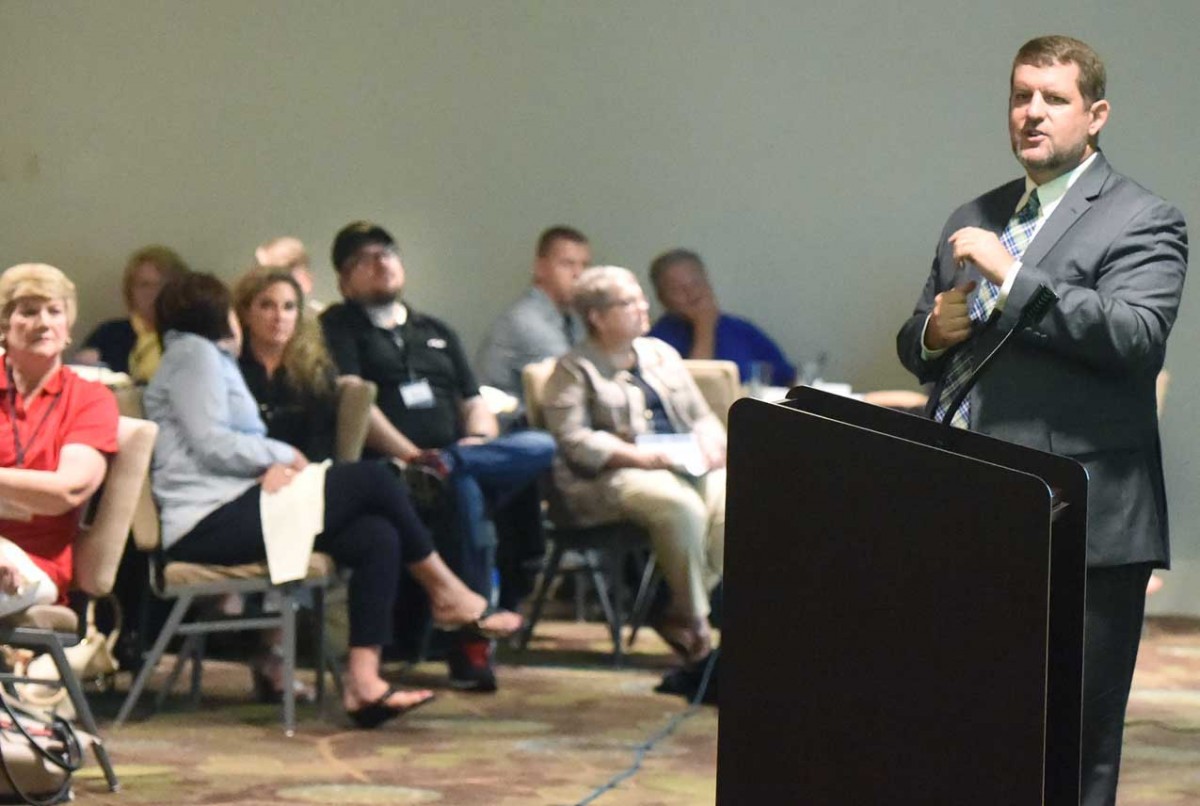MORGANTOWN — County clerks from around the state are in Morgantown taking a two-day plunge into election protection and cybersecurity.
Secretary of State Mac Warner brought the election protection and training conference to the University Holiday Inn on Pineview Drive Monday and today.
Warner said there is $6.5 million in federal funding available to assist counties in improving their election security, including new voting equipment and help with Americans with Disabilities Act compliance.
While national media is focused on Russian meddling in the 2016 presidential election, Matt Masterson, senior cybersecurity advisor for the U.S. Department of Homeland Security (DHS) highlighted Monday’s schedule with an overview of the need for secure elections clear down to the county level.
Masterson mentioned the 2016 Russian hacking of Illinois’ election system. “Outside of Illinois, you are all targeted,” he said.
Hackers come in several varieties, he said: Foreign governments, terrorists, criminal hackers, even office insiders with a grudge. Their motives may vary, too, but overall, they want to undermine confidence in the election process in all 10,000 jurisdictions across the country.
Attacks can also come in various forms. In March, Atlanta was subject to a ransomware attack that is costing millions to recover from. With ransomware, the attacker uses software to lock you out of your system and demands money to let you back in.
Another common attack is spear phishing: specifically targeted spoof emails form an apparently trusted source intended to glean vital information.
Attacks may not go through the front door. The Target retail chain was hacked by starting small — an HVAC vendor’s system — and working its way up the chain. So thinking you’re a small county that won’t interest hackers is the wrong way to think, he said.
Masterson identified several keys to preparedness. Practice defense in depth: make sure there’s no single point of access to the entire system. Establish layers of protection.
Employ “air gaps,” meaning make sure your whole system isn’t internet connected. Don’t reuse memory devices, which can get corrupted. Update passwords after every election.
Overall, pursue resilience. “You have to be prepared to detect and recover.”
During a break, Warner talked about his involvement and interest in cybersecurity, stemming from his military days and hands-on elections experience in Haiti, Panama, Bosnia, Ukraine and other countries.
“That’s what has me energized as I came into this job as secretary of state.” Then news of the Russian hacking of the Democratic National Committee system and the Russian election meddling came to light. Even before the election, the federal government knew a fair amount but didn’t really know what to do with the knowledge, he said. DHS was struggling with that role while getting pushback from the states to stay out of their business.
But DHS designated elections systems as part of the nation’s critical infrastructure, Warner said. “I decided it was better to be on the inside” and have a role in how it played out. He’s a member of the Elections Assistance Commission Government Coordinating Council.
Harvard’s Belfer Center for Science and International Affairs learned that a former military man was West Virginia’s secretary of state and invited Warner and his team to Boston for three exercises to help fine-tune its elections cybersecurity training.
Warner, in turn, invited two county clerks to help bring the message back to the counties. One of them was Monongalia County’s Carye Blaney, who served as a moderator for this conference.
Blaney said she recognizes that election security threats are real, no matter what the size of the state or county. “We need to be prepared as the front line of defense in our counties.
“Our role in Monongalia County,” she said, “we’ve sort of been on the front lines of all the technology. … I think that’s one of the reasons why the secretary asked me to participate.”
The conference, which concludes today with train-ing exercises and post-op evaluations, drew clerks from 53 counties and county elections officials — more than 150 people.





